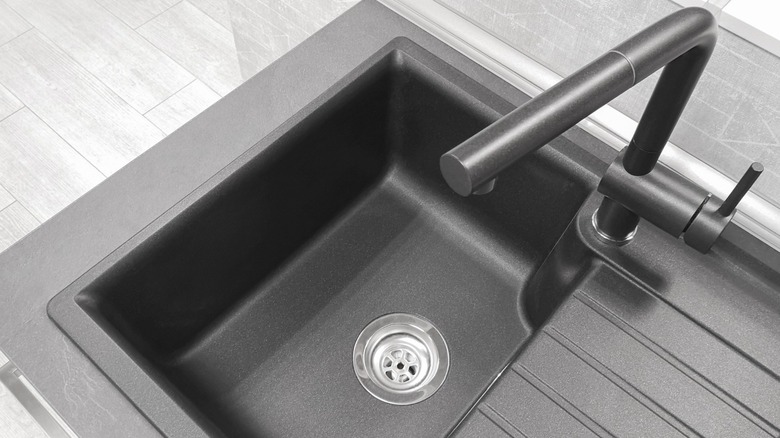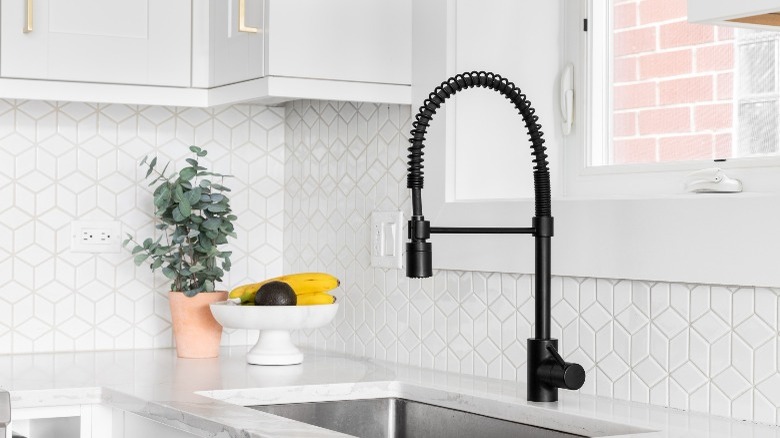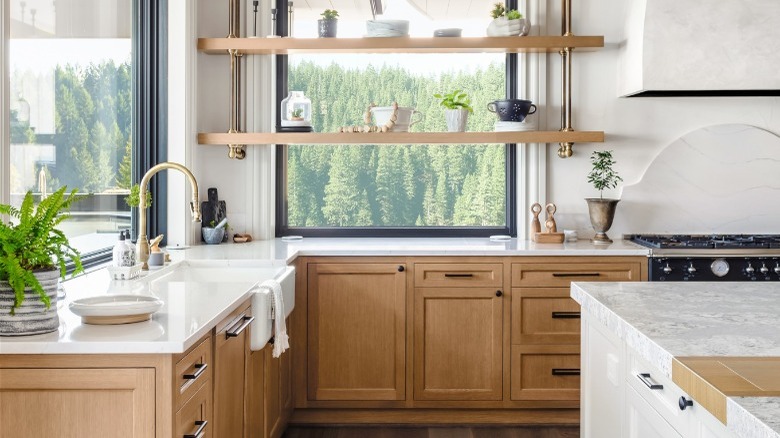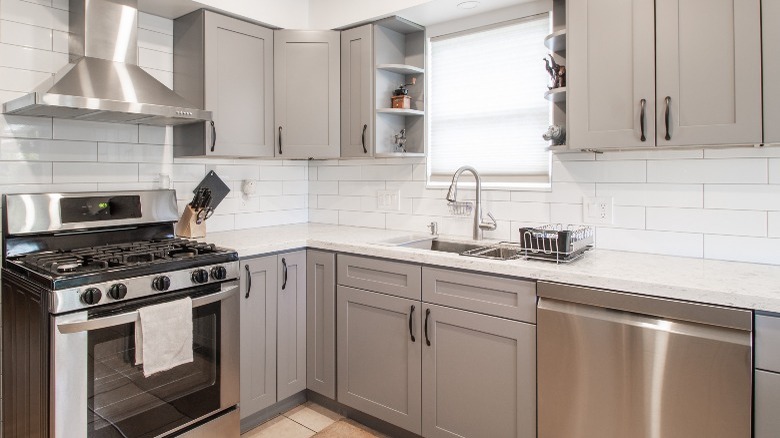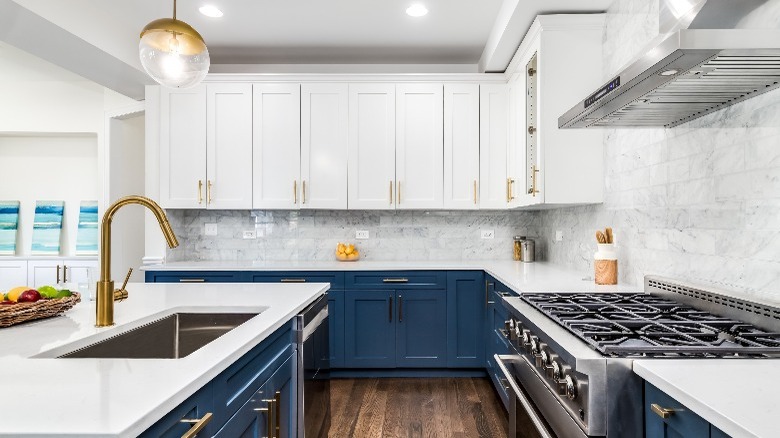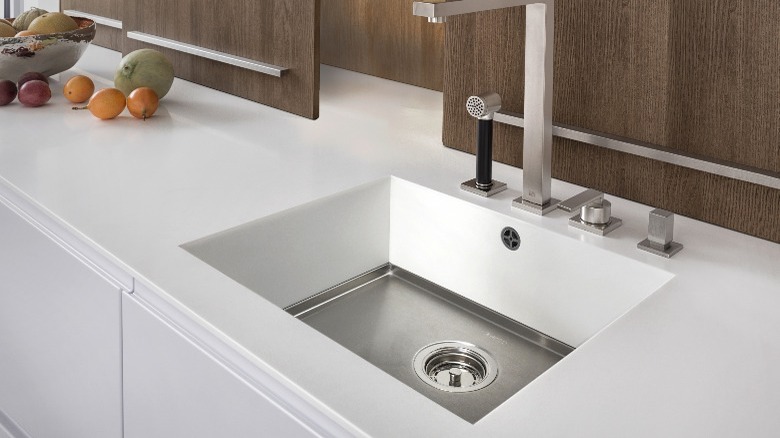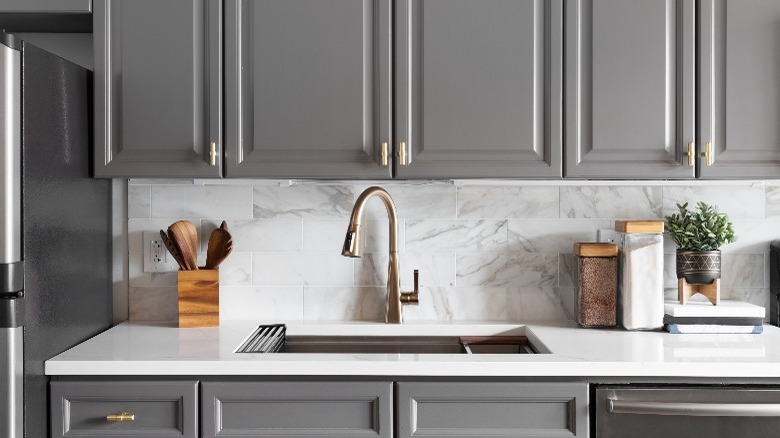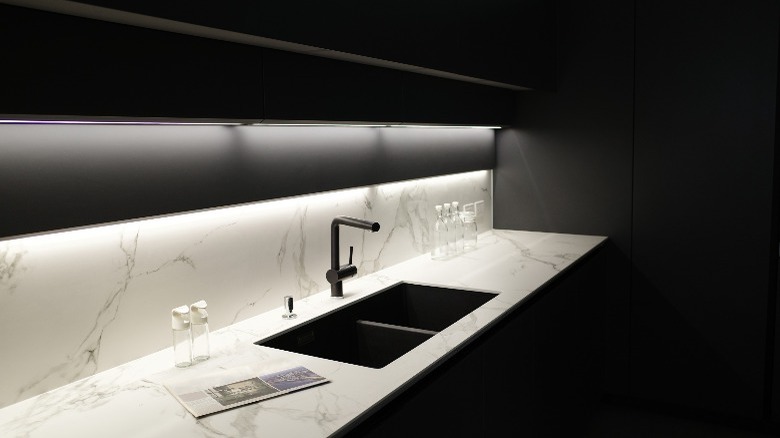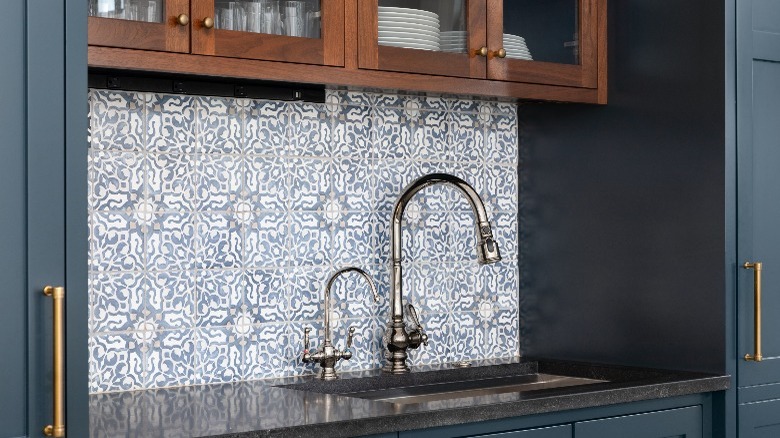Composite Sinks: What To Know Before You Buy
Whether you're doing a kitchen renovation or just replacing the kitchen sink, knowing about the different types of composite sinks and the pros and cons of each is of key importance. According to Kitchen Fittings Direct, choosing the right material for your sink, whether we're talking about the kitchen or the bathroom, is a big decision. There are so many different materials we're familiar with that all seem strangely appropriate, such as stainless steel, ceramic, and granite. So how do you choose?
One factor to consider is durability. A good quality sink should last 10 to 15 years, whereas a cheap sink may only last for a couple of years. Of all the widely available materials, composite sinks like quartz or granite are preferred in many homes today. This is due to their virtually stain-proof, heat-proof, impact-resistant, and scratch-proof surfaces. They are widely agreed to be superior to ceramic or stainless steel. However, if you're not up to speed on composite sinks, don't worry. We've done some great research for you, so now, all you have to do is keep reading!
What are composite sinks?
Let's assume we're starting from square one and going through the basics. You may think you know what composite sinks are, but do you? Composite is the key word here, which literally means that the item — in this case, a kitchen or a bathroom sink — is composed of more than one material. To be more specific, Cosmos Surfaces explains that a composite sink can consist of acrylics, resins, quartz, and granite. Composite granite sinks are not the same as natural granite sinks (and/or countertops), and instead offer a less expensive alternative that's more easily integrated into the rest of your kitchen design. This is because composite sinks are manufactured from a mix of acrylic resins and crushed natural materials like granite or quartz. This allows the new, highly durable material to be molded into sink shapes and to have a protective coating.
Due to this process, the design can be formulated to match your existing countertops or other kitchen design. It's important to note that with natural granite, each piece is totally unique, having its own defining qualities, which typically include imperfections. This is part of its pulchritude and prestige, but it's also part of its price tag! Natural granite and quartz are two of the most expensive sink and countertop materials. Composite granite is affordable and easier to clean and maintain than natural granite. However, both are extremely hard materials, making dishes more easily breakable if dropped. Composite sinks offer homeowners a middle ground for price and quality, giving the appearance and performance of natural granite or quartz.
How to care for composite sinks
If you're considering a composite sink, a part of your daily routine will be devoted to its care. QS Bathroom Supplies tells us composite sinks are easy to clean and care for on a day-to-day basis and require only a water-dampened washcloth for wiping down surfaces most of the time. The best tools for more thorough cleanings are simply a nylon scrubber or brush, mild dish soap, and water. Fill the sink partway with warm, soapy water and allow food stains to soak for an hour, give or take, depending on the tenacity of your stains. Take the nylon scrubber and gently scrub all sink surfaces with slow, circular motions. Additionally, for spring and fall cleaning projects, you can safely use your favorite kitchen cleaning product on your composite sink, as long as you don't use it regularly. Certain chemicals can break down the surface over time, so stick to plain old dish soap and water as much as possible.
Furthermore, if you have built-up limescale, hard water spots, or mildew stains, you can mix a solution of 1/2 white vinegar and 1/2 water in a spray bottle. Spray the mixture on the stains, use the nylon scrubber to rub out the spots gently, then rinse thoroughly. (Never use straight vinegar.) Another thing that makes composite sinks great is the fact that, unlike natural granite, they have a non-porous surface. This means stains are rarely ever a problem! However, if you need something stronger, you can make a solution of 50% bleach and 50% water in a bowl. Use a soft nylon brush and dip it into the liquid before applying it to the stain or spots. Gently brush in circles until they're gone. That's it!
What is a quartz composite sink and its advantages?
According to Dongguan Jiemei Electrical Appliance Co., a quartz composite sink has at least 70% crushed quartz mixed with acrylic resins. This composition results in a non-porous surface that is heat-resistant and stain-resistant. Quality Bath adds that quartz composite is one of the best choices in durability and even contains bacteria and odor-resistant qualities. Quartz can withstand heat up to 535 degrees, so if you take a pan right from the stove and set it down in the sink, it will show no damage. You can clean quartz composite with dish soap, water, and a nylon brush. The website recommends using a cleaning product called Bar Keeper's Friend when a deeper cleaning is needed.
Style Curator also notes that quartz composite sinks are inherently "quieter" than their stainless steel counterparts, making kitchen chores noticeably less loud. They come in black or white and lots of shades in between. While it's true that quartz composite sinks are expensive, they're also a high-quality product that lasts a long time. If you have quartz countertops, a quartz composite sink is a perfect choice. It's also important to note the choice of integrated quartz sinks, which are seamlessly matched to quartz countertops and custom designed to fit, making them a terrific (albeit quite a bit more expensive) choice.
What are the disadvantages of quartz composite sinks?
According to Green Garage, the color choices and pattern variations are a bit more restrictive with quartz composite sinks because they're not 100% natural stone. Customization is limited, and while some manufacturers offer different levels of shine, the only finish widely available is matte. Additionally, the hard surface makes breaking dishes a much easier occurrence! If you're lucky enough to have a young person around that does dishes as a chore — but you have expensive dishes — you might want to rethink any type of stone sink. But if you do decide to go with a quartz composite sink, you might want to choose a lighter color. Wear and tear on this surface seem more visible in darker shades.
Overall, quartz is one of the hardest materials you can choose, and if you have a light-colored kitchen scheme and want the quality of stone, quartz composite could be a terrific choice. But you won't have as many options in design, and they can become pricey. Additionally, some people don't care for the matte finish, especially for kitchen surfaces. This composite has many advantages and benefits, but it's not for everyone. Be sure to do your research and thoroughly inspect the materials before buying.
What is a granite composite sink and its advantages?
According to Sinkology, granite composite sinks are 95% crushed granite and 5% acrylic resins and are the most preferred type of granite sinks. One reason for this is that natural granite has to be correctly sealed annually and requires more care and maintenance. Interestingly, Quality Bath says the composition is more like 80% crushed granite and 20% acrylic resin. Still, the results are generally agreed to be a durable and high-quality material for a more reasonable price than natural granite.
Additionally, granite composite sinks are heat resistant, so the color won't fade or change when exposed to extreme heat. The finish is also resistant to scratches and chips, and will not stain or absorb water spots. It's even resistant to acid! Granite composite is long-lasting, durable, and comes in colors like shades of brown that aren't always available in quartz versions. Furthermore, it can be made to look like stone or marble, according to Freeyork Architecture.
Aside from natural stone, granite is considered the highest-quality composite sink available. The cost is considerably less than having pure granite put in, as well. Therefore you can see why this type of composite sink is an extremely popular and smart alternative for your wallet. Besides, you would have difficulty finding a manufacturer that even offers pure granite in a sink, as most granite sinks are actually granite composite.
What are the disadvantages of granite composite sinks?
Freeyork Architecture reports that while granite composite sinks offer a great alternative in many respects, we shouldn't discount the drawbacks. For one thing, it is inherently toxic due to the plastic (acrylic) materials it's made with. Over time, though considered chemically inert, the toxins from the plastics can leak into water and food supply. If you are especially environmentally conscious, this could be concerning. Additionally, you cannot use harsh scouring pads or materials on its surfaces, or harsh cleaning products. According to Ruvati, a manufacturer of granite composite sinks, daily care includes using a non-abrasive cleaner like Bar Keeper's Friend or standard dish soap.
A Quartz Sink says another drawback could be the cost, because even though granite composite costs less than pure granite, it's still a significant jump from stainless steel. Additionally, they're heavier and bulkier than other materials, and installation is therefore more difficult. You might have to reinforce the area with a bit more support before installing, causing additional costs. You'll have to consider that with granite composite, light colors stain much easier than dark colors, so if you have a light colored kitchen scheme, you'll want to opt for the quartz composite instead. The resins in the composite material are believed to draw certain stains into them and hold them permanently! And don't forget that chipping or cracking is still a possibility, albeit a smaller one.
What are the best brands of composite sinks?
According to Mr. Kitchen Faucets, the top three trusted brands for composite sinks are Kraüs, Blanco, and Ruvati. Kitchen Feeds lists the same three brands in the order of Blanco, Ruvati, and Kraüs, so it's safe to assume these are the brand leaders. So let's check out these highest recommended products. First, Kraüs is a German manufacturer well known for its quality stone composite sinks. The KGD-442 is mentioned in the first source, and on the Kraüs website, it has a ranking of 4.7 out of 5 stars, with 96% of reviewers stating they recommend the product out of over 250 reviews. The second source names the KGD-54GREY, an equally impressive model called the Forteza, a large single bowl undermount.
Next is Blanco, with the second source listing the Biscotti 441215 as its top pick for the best single-bowl granite composite sink. The color is — you guessed it — biscotti, which makes for a very elegant-looking sink, with excellent quality to boot. The first source mentions the Blanco 440195 Diamond Silgranit kitchen sink, and it's important to note that Siligranit is a patented composite by the Blanco company. It's considered the best process, and its Siligranit sinks are patented with a Hygienic Plus surface formula that reduces bacteria growth by 98%. This brand is a top name to look for in composite sinks. Ruvati is the third brand, and the first source lists model RVG1080BK, which is a lovely-looking single bowl granite composite top mount sink. The second source mentions the RVG1033GR as the best top-mount granite composite sink, in a silver-gray color.
Value and price range for composite sinks
So now that you know quite a bit about composite sinks let's talk price range and value for your money. According to Kitchen Remodel Guides, there are a few things to weigh when considering composite sinks' prices. Size is one, with widths from 15 to 36 inches and depths from 6 to 12 inches. Configurations are another, with single, double, and even triple basin combinations available. Then, of course, there's color and design, ranging from shades of black, grays, browns, and white, and stone or marble-looking patterns. Last but not least, you've got types, including top mount, undermount, and farmhouse sinks. Once you've got a good idea of what you need, let's take a look at what to expect for the price range.
For the average price of top mount granite composite sinks, you're looking at $150 to $375, but prices can reach $1,250 at the high end. Uncle Paul's Kitchen says quartz composite sinks generally range between $200 to $600. Granite composite undermount sinks cost an average of $200 to $425 but can reach $1,400. Granite composite farmhouse sinks average $450 to $750, with high-end prices up to $1,500 or more for custom work. And Angi estimates the sink installation cost is between $216 to $628. Hopefully, you've found this information helpful and use it to educate and guide you in purchasing a composite sink.
